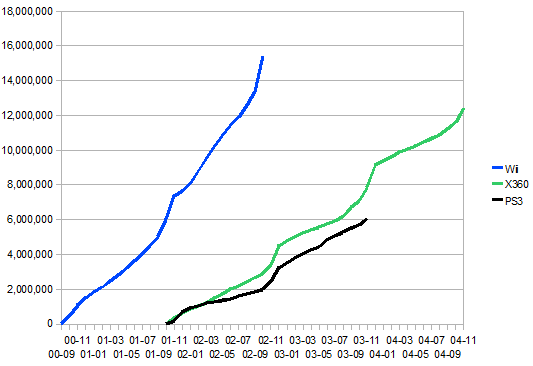Just for the record, I can come up with a much better hypothesis than "Nintendo is magical" that also is much more logically robust.
I think virtually all game publishers approach game design in a slightly different way from Nintendo. I think companies like EA and Ubisoft approach a game and ask, "What demographic does this appeal to?" And then work their hardest to make it appeal even more to them. If it's a shooter, it's going to appeal to males age 16-35. Therefore, add more profanity and violence, add somber tones and grizzled men. If the game has animals in it, put as much pink on the cover as you can, and make the game as cute as possible. This makes the game appeal more to 16-35 year old males (or 6-14 year old girls, respecitvely), but also tends to make other demographics even less inclined to purchase that software. That's the approach though, and in the past its worked: pick a demographic, and nail it as hard as you possibly can.
By comparison, Nintendo seem to approach all demographics -- boys, girls, men, women, and the elderly -- with a single game. I think this does have a weakness: these types of games tend to appeal less strongly to any single demographic than a game that was targeted exclusively to them would, but overall tends to sell more. Put more simply, a Nintendo game may grab 1/3 of each demographic, but appeal to all demographics in the process, while an EA game may appeal to 4/5 of a single demographic, but have virtually no appeal outside of that.
This may seem like a fairly minor distinction, but it dramatically changes how games sell on a Nintendo system. I think the Wii is built on the backs of a wide variety of consumers: boys, girls, men, women, and the elderly. All of them. Hardcore gamers and casual ones, old school gamers who like the VC and new wave ones, too.
In that particular environment, companies like Nintendo do well, because that particular hardware has a wide variety of consumers. Games that target a single demographic -- whether that demographic be exclusively 16-35 year old males like Call of Duty or exclusively 6-14 year old girls like Dogz -- will do less well, although the user base is big enough now that they can do well enough if executed properly.
That is why they struggle. That's my theory, at least. This is something they can alter, but it's very challenging. Changing your entire philosophy of game design is a very difficult thing to do, even if it may not sound like it.


